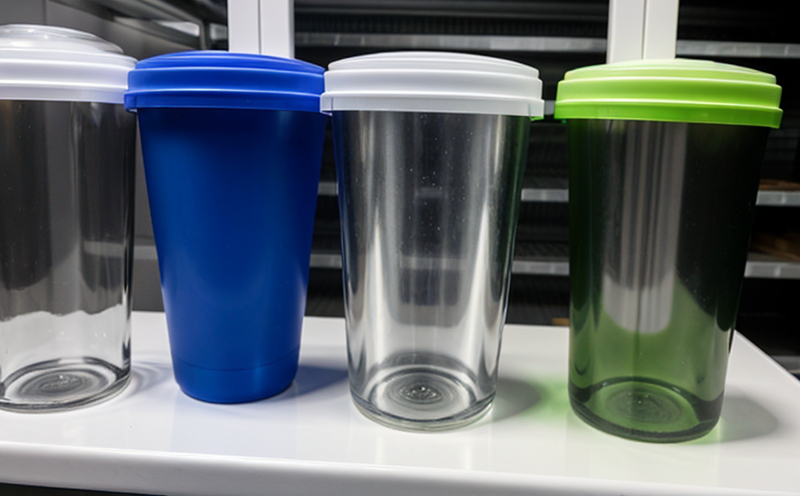ASTM D3569-10 Seal Performance of Glass Containers
The ASTM D3569-10 seal performance test is a critical procedure for ensuring the integrity and reliability of glass containers used in various industries, including pharmaceuticals, food and beverage, and cosmetics. This test evaluates the effectiveness of seals on glass containers to prevent leakage and contamination. The primary purpose of this test is to ensure that glass containers meet stringent quality control standards, thereby maintaining product safety and shelf-life.
The ASTM D3569-10 seal performance test involves subjecting sealed glass containers to a specified pressure differential for a set period. During the test, the integrity of the seal is monitored by measuring changes in weight, volume, or pressure within the container. The test simulates real-world conditions that may cause seal failure, such as temperature fluctuations and mechanical stress.
Proper sealing is essential to prevent contamination from external sources, which can lead to product spoilage or recalls. This ensures consumer safety and compliance with regulatory requirements. Seal failures in glass containers can result in significant financial losses due to product returns, legal disputes, and reputational damage. Therefore, it is crucial to perform regular seal performance tests on all glass packaging.
The ASTM D3569-10 test is widely recognized for its ability to identify potential sealing issues early in the production process. This enables manufacturers to address these issues before the product reaches the market, reducing the risk of contamination and ensuring compliance with international standards. The test can also be used as a quality control measure during the research and development phase, allowing engineers to optimize seal design and material selection.
The ASTM D3569-10 seal performance test is an essential tool for maintaining product integrity and safety in industries that rely heavily on glass packaging. By ensuring proper sealing of containers, this test helps to prevent contamination, extend shelf life, and maintain consumer trust. The test's accuracy and reliability are further enhanced by its adherence to international standards, such as ASTM D3569-10.
For pharmaceutical manufacturers, the seal performance test ensures that drug products remain sterile during storage and transportation. Similarly, for food and beverage companies, this test helps maintain product freshness and safety. In cosmetics, the test is used to ensure that the container maintains its integrity throughout the shelf life of the product. The ASTM D3569-10 seal performance test is a critical step in ensuring product quality and compliance with international standards.
Industry Applications
| Industry | Application |
|---|---|
| Packaging | Evaluating the integrity of glass containers used in packaging. |
| Pharmaceuticals | Ensuring drug products remain sterile during storage and transportation. |
| Food & Beverage | Maintaining product freshness and safety by assessing container seal integrity. |
| Cosmetics | Guaranteeing that the container maintains its integrity throughout the shelf life of the product. |
International Acceptance and Recognition
- The ASTM D3569-10 seal performance test is widely recognized by regulatory bodies around the world, including the FDA (USA), EMA (EU), and TGA (Australia).
- Major pharmaceutical companies globally use this test to ensure product quality and safety.
- Food and beverage manufacturers worldwide rely on this test for maintaining product integrity and freshness.
- Cosmetics firms around the world use ASTM D3569-10 as a standard procedure for evaluating glass container seal performance.
Environmental and Sustainability Contributions
The ASTM D3569-10 seal performance test plays a significant role in enhancing environmental sustainability by ensuring that glass containers are manufactured to the highest standards of quality and safety. By preventing leaks and contamination, this test helps reduce waste and resource consumption. Properly sealed glass containers can be reused or recycled more effectively, reducing the need for new raw materials.
Additionally, the ASTM D3569-10 seal performance test contributes to sustainability by ensuring that products remain safe and effective throughout their shelf life. This reduces the likelihood of product recalls and returns, which can lead to unnecessary waste and environmental impact. By maintaining high standards of quality control, this test helps to reduce the overall carbon footprint associated with packaging materials.
The ASTM D3569-10 seal performance test is an essential tool for promoting sustainable practices in the packaging industry. By ensuring that glass containers are properly sealed, it contributes to a more efficient and environmentally friendly supply chain. This test also helps to reduce waste by extending the shelf life of products, thereby reducing the need for replacement.





